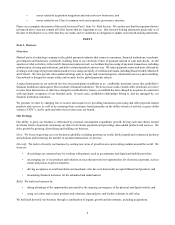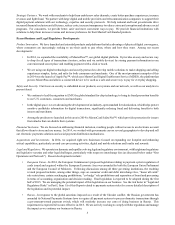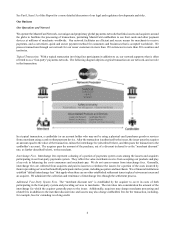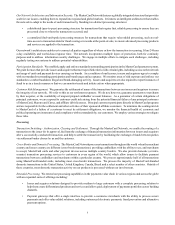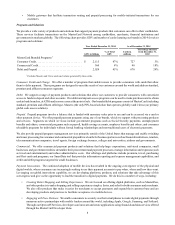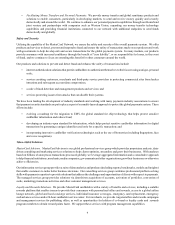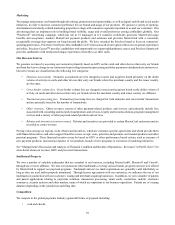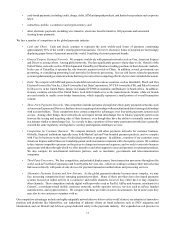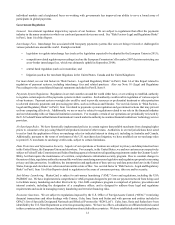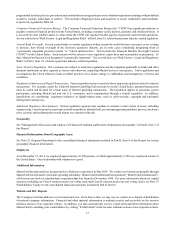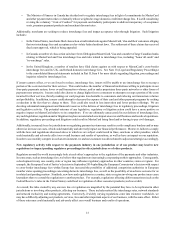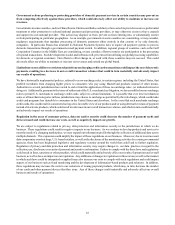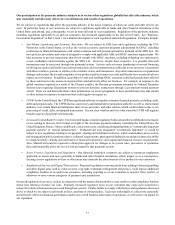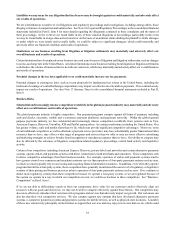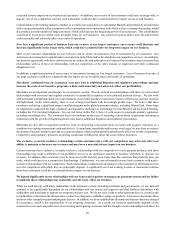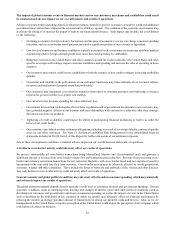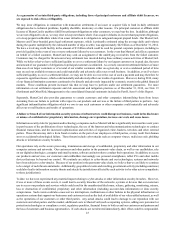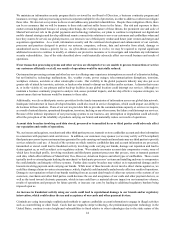MasterCard 2014 Annual Report Download - page 16
Download and view the complete annual report
Please find page 16 of the 2014 MasterCard annual report below. You can navigate through the pages in the report by either clicking on the pages listed below, or by using the keyword search tool below to find specific information within the annual report.14
Our annual report on Form 10-K, quarterly reports on Form 10-Q, current reports on Form 8-K and amendments to those reports
are available, without charge, for review on the investor relations section of our corporate website as soon as reasonably practicable
after they are filed with, or furnished to, the U.S. Securities and Exchange Commission. The information contained on our website
is not incorporated by reference into this Report.
Item 1A. Risk Factors
Legal and Regulatory Risks
The payments industry, and in particular interchange fees, is the subject of significant and intense global legal, regulatory
and legislative focus, and the resulting decisions, regulations and legislation may have a material adverse impact on our
overall business and results of operations.
Interchange fees are generally the largest component of the costs that acquirers charge merchants in connection with the acceptance
of payment cards. Although we do not earn revenues from interchange fees, they are a factor on which we compete with other
payment providers and therefore an important determinant of the volume of transactions we see on our cards. We have historically
set default interchange fees in the United States and certain other countries. In some jurisdictions, however, interchange fees and
related practices are subject to regulatory activity and litigation that have limited our ability to establish default rates. Regulators
and legislative bodies in a number of countries, as well as merchants, are seeking to reduce these fees through legislation,
competition-related regulatory proceedings, central bank regulation and/or litigation.
More broadly, regulators in several jurisdictions increasingly have been leveraging, or seeking to establish, the authority to regulate
certain aspects of payments systems such as ours. These regulations have, and could further result in, obligations or restrictions
with respect to not only interchange fees but also the types of products that we may offer to consumers, the countries in which
our cards and other payment devices may be used, the way we structure and operate our business and the types of cardholders and
merchants who can obtain or accept our cards. These obligations and restrictions could be further increased as more jurisdictions
impose oversight of payment systems.
Examples of activity related to interchange fees and the payments system include:
• In July 2013, the European Commission proposed legislation relating to payment system regulation of cards issued and
acquired within the European Economic Area, which was amended in 2014 by both the European Parliament and the
European Council of Ministers. Following discussions among all three governing institutions, the resulting revised
proposal includes: (1) a cap on consumer credit and debit interchange fees of 30 basis points and 20 basis points,
respectively (a significant reduction in fees), with the ability of EU member states to impose more restrictive domestic
debit interchange levels; (2) restrictions on our “honor all cards” rule with respect to products with different levels of
interchange; (3) a prohibition of surcharging by merchants for products that are subject to regulated interchange rates;
(4) the prohibition of rules that prevent a consumer from requesting a “co-badged” card (that is, a credit or debit card on
which an issuer has put a competing brand); and (5) the separation of brand and processing in terms of accounting,
organization and decision making. While the proposed legislation does not directly regulate network fees, it makes clear
that network fees cannot be used to circumvent the interchange fee restrictions. Final legislation, which could differ, is
expected to be adopted in 2015.
• In the United States, Federal Reserve regulations limit per-transaction U.S. debit and prepaid interchange fees for certain
large issuers to 22 cents plus five basis points (with certain adjustments and exemptions), subject to reexamination and
potential re-setting. While not directly regulating network fees, the rules make clear that network fees cannot be used to
circumvent the interchange fee restrictions. The regulations require debit and prepaid cards to be enabled with two
unaffiliated payments networks. Moreover, an issuer or payments network may not inhibit the ability of any person that
accepts or honors a debit or prepaid card to direct the routing of the card transaction for processing over any network
enabled on the card.
• Legislation regulating the level of domestic interchange fees has been enacted, or is being considered, in many jurisdictions,
including Australia, Hungary, Israel, Poland, South Africa and Spain.
• A negative decision with respect to our cross-border interchange fees within Europe for consumer credit and debit cards
was upheld in 2014 by the European Court of Justice.
• Several jurisdictions have recently created or granted authority to create new regulatory bodies that either have or would
have the authority to regulate payment systems, including Brazil, India, Mexico, Russia and the United Kingdom (which
is considering designating MasterCard as a payments system).


